2023 Breakthrough Makers
Paving the way for healing
On July 7, 2021, Ebony Morris, a patient service associate, stood at the meet and greet sign-in desk in the Emergency Department (ED), which was particularly busy. Through the crowd of patients and families waiting to be seen, Ebony noticed a family standing at the back of the room looking unsure and nervous.
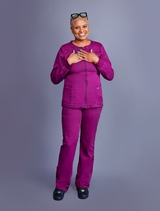
"I know I'm the first line of contact — the first person [families] they interact with at CHOP — so I feel like I set the tone. It all starts with the person at the front desk," said Ebony. With that in mind, she welcomed the family to see how she could help put them at ease.
What Ebony didn't know at the time was that this family was at CHOP to meet with Linda Hawkins, Director of the Gender & Sexuality Development Program. This program supports transgender children, youth and their families, and the family in the ED was part of the clinic. According to Linda, this particular child was entertaining suicidal thoughts and had previously had a horrible experience at another hospital, so much so that he vowed to never return to a hospital. "After a lot of discussion and persuasion from myself and his mom stating that he would be treated with respect and care at CHOP, he agreed to meet me in the ED and get evaluated and admitted," said Linda.
The first stop in the ED was Ebony, who did not know this patient's background but saw a distressed child in need of some kindness. Ebony reassured the patient and family that they were in the right place and asked permission before each step of admittance and, notably, omitted pronouns as part of her standard practice. "I don't use pronouns; I always make sure that I say, 'the patient.' I don't like to assume or come off as disrespectful," says Ebony." I also always ask the patient if it's okay that I put the hospital band on and other steps in the process because I want them to know they have a voice."
"She was amazing," remembers Linda. "Calming and supportive, didn't use any pronouns and made the first step the most comfortable, safe and respectful step in his path to a new and better hospital experience. Ebony's calm and grace was good for all of us, especially since [the patient] was truly waiting for someone to make a mistake."
Following this interaction, the child left the ED to be admitted and Ebony returned to the rest of her day. It wasn't until later, when Linda sent Ebony a Bravo for her compassion, respect and excellence that Ebony realized the true impact of her interaction with this patient and his family. "You never know the impact you make on a person; that's why I always say be kind," said Ebony. "I'm happy I was there. I'm happy I was able to give that patient a little more comfort, a little more hope that it was going to be okay."
After nearly eight years as a patient service associate, Ebony understands that "every patient and family that comes in the hospital requires a unique level of understanding and care. It's my duty to identify that need and offer as much hope and resolve as possible."
"Thank you, Ebony, for making this experience for a very scared and sad transgender youth so safe and respectful," says Linda. "Thanks to [Ebony's] great care, this youth is now home and is finally open to getting more care and has more hope than I've ever seen before in his life."
Compassion, creativity, cooking
In Jan. 2022, a medically complex 16-year-old patient was admitted to CHOP. Due to a lack of stable housing and her ongoing medical and behavioral health needs, she was transferred to the Middleman Family Pavilion to provide her with adequate critical care needs. Because of the patient's needs, she required frequent one-on-one interaction and activities to help keep her preoccupied. Lynn Boyle, PICU nurse manager, and the KOPH team made it their priority to make her stay both safe and engaging. One of the ways they accomplished this was to create a cooking class for this patient to help her take accountability for her diet in a fun way.
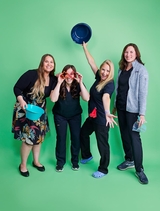
Lynn engaged Shiela Falk, Clinical Nutrition Supervisor; and Stephanie Wiegert, Manager of Food Services, to develop an eight-week cooking class series. Each week, clinical nutrition and food services took turns educating the patient about each meal. After donning her personalized "CHOP King of Prussia Chef" jacket, the patient prepared the meal with them. One of the dietetic technicians even developed a dietitian handout for each meal or snack that the patient was able to color in after each session.
On July 4, Shiela and the dietetic technician came into work and held a cooking class for the patient with a Fourth of July theme. Together, they created a cake of the American flag, made from diet-friendly ingredients, and a parfait that the patient was able to enjoy afterwards. The reaction from the patient was worth every effort this team made – her smile beamed ear to ear, and she was so proud of the creation she made. The cake was placed in a display cakebox so the nursing team could see what their patient created that day. Nurses came by her room to compliment her on her hard work which made the patient’s day.
The dedication, care, compassion, love and creativity that this team demonstrated to do something unique for this patient are perfect examples of the innovative culture we aspire to achieve on both our Philadelphia and King of Prussia Campuses and a hallmark of the ICARE values that our organization is built upon.
Innovation for breastfeeding colleagues
As recent and current breastfeeding mothers, CHOP team members Mary Jo Gumbel and Beth Connor experienced firsthand the struggle that ensues when trying to secure a lactation room to pump breast milk during a busy workday. In 2019, when both were clinical nurses in the Post-Anesthesia Care Unit (PACU), they would spend most of their 30-minute pump break running from floor to floor to find an open lactation room.
Because it took so long to find an available room, their pumping time was often rushed and stressful. For lactating mothers, the inability to fully empty their breasts can lead to decreased milk production and ultimately negatively affect their babies' growth and wellbeing. This situation was also impacting co-workers: When a lactating mother couldn't find an available room to pump, they sometimes had to extend their break, leaving teammates to extend coverage for them.

With all this in mind, Mary Jo and Beth met with CHOP's Office of Entrepreneurship and Innovation (OEI) and Emerging Technology and Transformation (ET&T) teams to discuss the idea of developing a system for reserving lactation rooms. As a team, they launched a survey to gather information to help develop a plan of action. They also worked with Human Resources (HR) to collect data about the number of potential lactating employees at CHOP (e.g. estimated number of female staff of childbearing age, number of staff out on maternity leave in the previous fiscal year, etc.) to estimate the financial implications associated with time spent searching for a lactation room.
"In our research before we went to OEI, we found that hospitals were at the top of the list for Department of Labor complaints/violations for nursing mothers, with the majority of complaints relating to not having enough rooms or time to pump," says Beth. "We thought, 'We can do better! CHOP can talk the talk and walk the walk as a leading pediatric healthcare enterprise.'"
The team surveyed 186 nurses at CHOP who had previously, or were currently, breastfeeding. They found that almost 50% of the participants spent five to 15 minutes of their 30-minute pump break searching for an available room. About 74% of those surveyed expressed they consistently encountered issues with finding a lactation room when they needed to use one. And more than half the survey respondents indicated that it took 20 to 30 minutes to comfortably pump. Based on the data gathered from the survey, the team learned that it required at least 25 to 45 minutes per pumping session to find a lactation room, pump, store milk and return to the unit.
Beth, Mary Jo, as well as the OEI and ET&T teams discussed the possibility of developing a phone application to reserve a lactation room, similar to OpenTable or Resy, which are online reservation apps for restaurants. Through conversations with many stakeholders, Nghi Vo, IS Developer Principal of CHOP's ET&T team, created a chat bot that allowed users to text a dedicated phone number to begin a conversation and start the process to reserve a room for pumping. Along with the bot developed specifically for this project, he and IS Developer Kanchana Hegde put together a metrics dashboard that provided the working group with the validation needed to scale the tool.
Starting in August 2020, the tool was piloted and advertised in three locations on CHOP's Philadelphia Campus. To help build awareness of the trial, signage was hung up, emails advertising the chat bot were sent to staff and announcements were made at local meetings. The lactation bot team met every few weeks to troubleshoot and ensure the tool was working effectively. Adjustments were made along the way, based on feedback received via a REDCap survey that was texted to each user after they made a reservation.
Although marketing and technical support for the chat bot pilot concluded in November 2020, the pilot remained active to see if utilization of the tool would continue; the bot grew organically without issues during this time. From Aug. 2020 to March 2021—among the three piloted rooms at the Philadelphia Campus—the chat bot had a total of 2,062 reservations with 75 unique/returning users (64 employees, 11 patient families).
After receiving overwhelmingly positive data from the chat bot pilot survey, the team agreed the bot could be operationalized to save staff the time and hassle of searching for an open lactation room. They submitted the project to CHOP's Getting Rid of Senseless Stuff (GROSS) Program. GROSS was able to identify the appropriate stakeholders for the operational system, which meant the project could be fully realized.
The chat bot lactation room scheduling system was rolled out to the entire enterprise on July 7, 2022. The chat bot is available for use by CHOP staff in employee-facing lactation rooms; the reservation process is not available to visitors at this time. Future iterations of the chat bot will add other locations across the enterprise. A feedback mechanism is built into the chat bot to continue to gather suggestions for future updates.
"I'm grateful that we've had this opportunity to collaborate on life-supporting changes for CHOP staff and families," says Mary Jo. "Any life change poses challenges and I hope we can continue to find ways to support all staff at any stage of their life, whether it is becoming a new parent, grieving a loss, recovering from medical issues or any other life-transforming event."
Encouraging healing through fun
One day in late July didn't get off to a promising start for a young CHOP patient. He was recovering from a recent surgery, and it was his fourth day of not being allowed to eat any food. He woke up nauseous and spent most of the morning vomiting—not exactly the way an aspiring World Wrestling Entertainment (WWE) star wants to kick off his day.
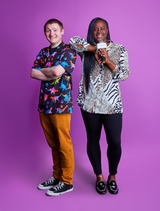
Fortunately, two of CHOP's Child Life and Creative Arts Therapy team members had been paying attention to what this patient's interests were and stepped in to help alter the course of his day. Andrea Dillard, Patient Media and Technology Manager, and Michal Warchol, a patient media and studio technician, were able to assist the patient in interviewing some of his real-life superheroes at CHOP's Seacrest Studios in the main atrium, a broadcast media center provided by the Ryan Seacrest Foundation. The studio enables patients to connect with some of their favorite idols and celebrities while exploring the creative realms of radio and television.
"We offered this opportunity to the patient after observing that wrestling was something he really enjoyed in his daily life," says Andrea. "It brought him a sense of normalcy and distraction from what he was going through at the hospital."
Facilitated by Andrea and Michal, the patient — a WWE superfan — was able to join other patients in Seacrest Studios in pediatric hospitals across the U.S. in virtually interviewing three WWE superstars: Roman Reigns, Ricochet and Natalia. Andrea helped run the technical aspects of the interview, while Michal helped host the interview and provided direction to the patients and other studios who were on the call.
"The patient was able to ask the wrestlers their favorite places to travel and to seek out advice about becoming a wrestler someday," says Andrea. "He smiled with joy throughout the interview and was excited that he got to ask questions he had thought of himself."
At the end of the call, Natalia and Roman Reigns gave this and other patients motivational advice about getting through challenging times: "Every storm will pass: it's not about weathering the storm, it's about learning how to play in the rain."
"Thanks to the team at Seacrest Studios, my son told me it was the best day of his life," says the patient's mother.
Quite a turnaround for a child who woke up that same day in a hospital bed post-surgery, not having eaten for four days and feeling nauseous!
"Finding out [my son] was going to get to talk to his favorite wrestlers brought him so much joy and life that it made me cry," says the patient's grateful mother. "When we finally got back home and everyone asked him about how his big surgery and hospital stay went, the only stories he retold were happy ones that included the studio!"
Mission accomplished.
Rallying support to celebrate milestones
From Dec. 15-22, 2022, during the COVID-19 pandemic, CHOP provided two one-time visitor passes to patients who were hospitalized for a week or more. The visitor passes could be used for a two-hour visit with a patient with no restriction on the visitor age. In just one week, over 175 of these passes were used by patients and their families. This pilot program allowed patients and their loved ones to enjoy spending time together while the child was hospitalized during COVID restrictions.
Lydia was one such patient who benefited from the visitor pass program. She had been admitted to CHOP in Oct. 2022 following a brain tumor diagnosis and subsequent surgery to remove the tumor. Lydia transferred to inpatient rehab shortly after her surgery, where she participated in daily intensive therapies. She was fortunate to have her parents by her side at CHOP all day, every day, but the person whom Lydia talked about and missed the most was her nine-year-old sister, Anna — her “best friend.” The first word Lydia said when she was able to talk again after surgery was “Anna”; they spoke over video chat every day.

Following an emotional meeting with Lydia's family, Kyla Madden, a Child Life specialist on the inpatient rehab unit, and Hannah Oh, a social worker, sat down with Lydia’s parents to talk to them about the visitor pass pilot program. When the parents realized that Anna could come and be with Lydia while she was at CHOP, they both broke down crying.
At the beginning of the pandemic, the inpatient rehab team had to get creative about how they discharged their patients in a safe and positive way. Their solution was to create discharge parades at which the entire interdisciplinary team that cared for the patient lined the hallways while the patient walked, rolled or ran down the aisle between their cheering caregivers to the song of their choice. Lydia’s parents asked for Anna’s visit to be a surprise during Lydia’s discharge parade. They wanted to celebrate this huge milestone as an entire family.
Admission to the hospital, especially a lengthy admission, affects the whole family. The visitor pass provided a great opportunity for Anna to see where Lydia had been during her hospitalization — to have closure of the experience — while at the same time celebrating the milestone of her younger sister’s discharge parade. The creativity and resilience of the inpatient rehab team during COVID provided a safe, encouraging patient and family experience!
Creating space for compassion during crisis
The day started out just like any other Tuesday for CHOP Newborn/Infant Intensive Care Unit (N/IICU) nurse Amy Gray Kelly, BSN, RNC-NIC, Clinical Nurse Expert and Clinical Lead for CHOP's N/IICU Transport Team. Having been in the N/IICU at CHOP for almost 15 years, Amy was the charge nurse of her home unit when the N/IICU transport nurse came to her and explained that CHOP's N/IICU transport team needed a second registered nurse to transfer a critically ill newborn from an outside hospital to CHOP.
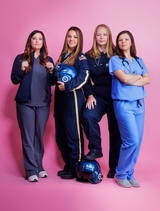
Time was of the essence. The communications center dispatched two ambulances to create the appropriate team of caregivers to support the sick infant's journey to CHOP. Amy and Kristen Coletti, MD, a neonatal fellow, were soon en route to the outside hospital with Larry Durland, PHRN, and Alan Carmichael, EMT.
The CHOP transport team met a team from the Middleman Family Pavilion at the outside hospital. They arrived at the bedside of an intubated infant who did not have a detectable blood pressure and had a rigid abdomen, blueberry muffin rash (dark purplish-blue spots) and poor perfusion. The transport team immediately began resuscitation efforts, while compassionate staff at the outside hospital brought the newborn's mom, dad and grandmother to the baby's bedside; the mom was still in her hospital bed recovering from a C-section.
"Certainly, there was an urgency to get the infant back to CHOP as quickly as possible; however, there was a way to accomplish prioritizing care while still giving the mom that special moment [with her baby]," Amy says. "We prioritized the needs of the whole family in a very dire and unstable situation."
As Amy packed the infant up for transport, she coordinated with Kristie Delio, RT, and Amy Klink, PHRN, to help the mom hold her infant. The team quickly discussed the risks versus benefits of holding or not holding and decided that the benefit of the mother being able to hold her acutely ill infant outweighed any risk. Amy gave the mom her baby, and the family of three were able to have a moment together.
"It felt natural to provide this moment for this family," Amy says. "It was an extra step; however, being from the N/IICU where we transfer and have parents hold babies all the time, it felt like the compassionate and right thing to do. I knew from experience that there was a good chance this baby may not survive. I did not want this mother to lose her baby without ever having held her."
The transport team continued trying to resuscitate the baby on the way back to CHOP in the ambulance. They called ahead to have the code cart and emergency blood ready for when they arrived in the N/IICU.
Soon after the transport team arrived back at CHOP with the neonatal patient, the child's father and grandmother also arrived. The decision was made to compassionately withdraw patient care due to the severity and progression of the baby's illness. The mom was still an inpatient at the outside hospital and wanted her memory of her baby to be as it was, holding her while still alive.
"It truly upsets me to think of the outcome had we not coordinated with this mom to hold her baby," says Amy. "After carrying a baby and going through an emergency C-section, I wanted to give this mom her moment — and this family their moment — to simply be as a family. Even if it was only for a few minutes."
She continues, "The true collaboration and efforts of this team went above and beyond to provide excellent, patient/family-centered care, and I was honored to be a part of this transport. A special thank you to Amy Klink, PHRN; Kristie Delio, RT; Larry Durland, PHRN; Kristen Coletti, NIICU fellow; and Alan Carmichael, our EMT, who all demonstrated CHOP's ICARE values to best support not only this infant, but also the entire family."
Providing care, encouraging dreams
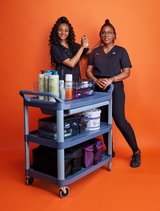
Members of CHOP’s Salon Services team, Jennifer Boisseau and Theresa Byrd, were called to Neurology to help a teenage patient who had just undergone surgery to target her epileptic episodes and now had a noticeable incision along the shaved area of her head. Jennifer and Theresa helped the patient get EEG paste out of her hair and gave her styling tips. The cosmetologists used an overnight deep conditioning treatment and returned the next day to wash, cut and style her hair. The new hairstyle safely concealed the patient's incision.
During this appointment, Jennifer and Theresa also learned that the patient was an aspiring cosmetologist and was worried about how her epilepsy would impact achieving her dream. The two cosmetologists shared videos and stories of well-known hairstylists with a range of motor abilities, including a hairdresser that styles hair with one hand. Jennifer and Theresa encouraged the patient to keep practicing to maintain muscle memory. They gave her a mannequin to practice braiding hair to maintain her muscle memory. The timing was perfect – her occupational therapist agreed that practicing was crucial to keeping the dexterity in her hand, and it aligned with the daily therapy she was receiving.
Attention to detail expedites lifesaving care
Part of Sue Allizzo’s daily responsibilities as Chief Medical Technologist at CHOP is to look at the cell morphology (meaning their shape, structure, form and size) for all oncology inpatients, which is something she has done countless times during her more than 30 years in CHOP’s hematology oncology lab. When Susan arrived at work at 6 a.m. one morning in March 2022, the night shift had flagged an Emergency Department (ED) patient’s results for Sue to review because they recognized something that didn’t seem right. The results were those of a 15-year-old patient who came to the ED with bleeding after dental work and a lower-than-normal number of red and white blood cells and platelets in her blood.
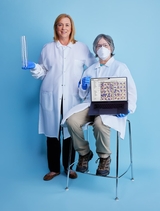
Upon looking at the patient’s blood sample under the microscope, Sue realized the patient had acute promyelocytic leukemia (APL), a very rare type of leukemia which, when not diagnosed and treated very quickly, can have dire consequences. APL patients require further testing to confirm the diagnosis, followed by rapid treatment with ATRA, which is the drug regimen of choice for patients with APL.
Sue immediately notified the ED team to inform them of her findings. Within minutes, the team was able to consult with the patient and her family. Susan quickly followed her notification to the ED team by reaching out to the on-call oncology clinician. When her co-worker, Marybeth Helfrich, a Technical Specialist III with over 40 years of experience in hematology, oncology and hematopathology, arrived at work at 7:30 a.m. the same morning, she confirmed Sue’s finding of APL.
With APL, every hour counts. Sue and Marybeth knew there wasn’t time for the lab’s usual protocol for new leukemia patients, which requires sedating the patient and obtaining a bone marrow sample. The seasoned duo was able to send the same sample the hematology lab had used for the patient’s blood count (which had led to the initial diagnosis of APL) for definitive, confirmatory testing for APL. Marybeth notified both the oncology and hematopathology attendings that no additional samples needed to be acquired from the patient in the ED.
The patient’s specific chromosomal translocations were reported out at 10:30 a.m. and oncology was able to proceed with the appropriate treatment for the patient that same day. This team’s questioning attitude, attention to detail, expert knowledge and clear communication enabled the expedited delivery of lifesaving care when this patient needed it most, highlighting the incredible technical skills, depth of experience and outstanding talent of CHOP’s world-class team.
A small act of kindness, a big impact
In October 2022, during a capacity surge at CHOP, clinical nurse Margaux Rogers was having a particularly rough night in the PICU. She had been assigned three patients for the first time in her career. Feeling overwhelmed, she was finally able to take her lunch break at 3 a.m. She went downstairs to the cafeteria for some food only to remember that the cafeteria had just changed its hours a few days earlier, so she was too late to get anything to eat.
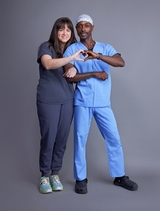
“I felt like I was failing at my shift, and I didn’t really know what to do, so I decided to go outside and cry in the fresh air,” Margaux recalls.
As Margaux sat sobbing, Alex Williams, who works in CHOP’s receiving team in Supply Chain and Logistics, walked by and asked her if she was alright. Margaux quickly brushed Alex off and told him she was fine — which couldn’t have been further from the truth.
“I was working a late-night shift,” says Alex. “I was walking outside on my lunch break, and I saw a young woman sitting on a bench crying. Since it was after hours, I was a little concerned.”
Alex gave Margaux a few more minutes to herself and then approached her another time, again inquiring as to whether she was okay. This time, he saw her crying fade away and a smile appear on her face. He was relieved to see that she was okay and able to get back to work.
“At the end of the day, we always need to treat people with kindness, practice CHOP’s ICARE
values and treat people how we want to be treated,” says Alex. “We are all human.”
After being at a low point where she was considering quitting her job, Margaux was strengthened by the kindness of a stranger who, at three in the morning, cared enough to ask if she was okay. Her experience underscores the positive impact of checking in with each other and supporting one another.
“Alex made me feel like I could go back up there [to the PICU] and do my job,” says Margaux. “He reminded me of the community that can be found even at a huge hospital. Thank you, Alex.”
A commitment to zero preventable harm
Teams in the CHOP Medical Behavioral Unit are using data and interpersonal connections on their journey to increase the safety of patients and staff.

The Medical Behavioral Unit (MBU) is a 10-bed unit located on the 4th floor of Seashore House on CHOP’s Philadelphia Campus. The unit is designed for children with medical and behavioral health needs and allows teams to streamline care across disciplines.
In June of 2021, leaders from Pediatrics, Psychiatry, Nursing and Behavioral Health Clinician teams across the MBU came together to discuss a quality improvement project focused on decreasing physical restraint use within the MBU.
With support from Dan Hyman, Chief Quality and Safety Officer, as well as Senior Enterprise Improvement Advisors Claire Gunnison and Julie Beauchamps from the Center for Healthcare Quality and Analytics (CHQA), this team set out to decrease the MBU’s average of 40 physical restraint events per month.
In accordance with Joint Commission and CHOP policy, physical restraints can be placed on patients who are exhibiting behavior that puts themselves or staff in danger. Physical restraints should be used only after trying all other de-escalation tactics, as it can be a traumatic experience for everyone involved.
“While physical restraints have long been viewed as a safety measure, we’ve been trying to change the messaging around their use and to identify what we can do to not use them and still be safe,” says Evan Dalton, MD, an attending pediatrician in the MBU.
Evan worked with Gabriela Andrade, MD, psychiatrist and Co-Medical Director of the MBU; Kathleen (Kate) Raymond, MBU nurse manager; and Brian Kovacs, Behavioral Health Clinicians manager, to review physical restraint data and design a MBU de-escalation protocol. Educating staff on de-escalation protocols was helpful but did not result in a decrease in physical restraint use. The team decided to pivot to a huddle-based approach in Feb. 2022.
Each morning at 8:30 a.m., a team made up of a behavior analyst, a nurse, a behavioral health clinician and a pediatrician met to identify the MBU patients at highest risk for agitation. After identifying these high-risk patients, the team huddled with each patient’s bedside care team to discuss the plan of care. During this test of change, the team found that their huddles were creating space to build professional, interpersonal relationships among team members that may not have worked together before. Bedside teams were able to build trust in their colleagues during these huddles and aligned on a shared mental model for use during high-stress de-escalations.
In May 2022, the team decided to trial an entirely new position, the Behavioral Healthcare Clinicians (BHC) charge, to sustain these huddles. Capri Burnett and David Lemisch, two MBU BHCs, were the first to pilot the BHC charge role for the MBU. BHC charges run the team’s huddles in the morning and assist with de-escalations throughout the day. BHC charges could keep care teams connected and act as the “experts” of the MBU. Over a two-month period, Capri and David helped create standardized, scripted huddles that streamlined the team’s improvement process. The MBU fully adopted and expanded the Charge role in July 2022 to provide 24/7 coverage for a continuous model of huddles and de-escalation support.
The statistics show that this new process is working. The MBU had three physical restraint events in Sept. and five in Oct., an 80% reduction in the MBU’s monthly average, along with a 26-day period without any restraint use.
Kate shared her thoughts on the team’s success: “I have been so thankful for the engagement and resilience of our frontline team members throughout this process. The success of this work speaks volumes to their dedication to our patients and their safety. Frontline staff have partnered in new ways to work as a group to focus on achieving a shared goal. This team is truly incredible and continues to amaze me through the most challenging of circumstances.”
The Violent Restraint Reduction Operations Committee is continuing to work on expanding the BHC charge role to other units and standardizing debriefs to create a support space for staff when physical restraint events do happen. While breakthrough to zero is the mindset, safety is always the top priority.
The MBU continues to use their data as a road map for improvement by identifying other relevant trends, such as the length of time patients are in physical restraints. By calling out the need for change and engaging team members at all levels, the MBU has a renewed commitment to breaking through to zero as it works to safely reduce physical restraint events.
Comfort in the face of fear
Chase did not want his blood drawn on a recent visit to CHOP’s King of Prussia Specialty Care Center. Security Officer Corporal Donald Williams was doing his regular rounds when he noticed the boy sitting on the floor in a corner with his iPad. His mother was down on her hands and knees, pleading with her son. Donald gave the mom a thumbs up and asked if everything was okay.
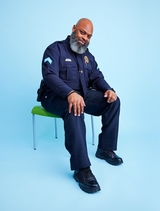
“I could tell by her body language that something was going on,” Donald recalls. “She looked distressed.”
The mother explained that her son was upset about getting his blood drawn because he had a fear of needles. Donald explained that he, too, was scared of needles, and asked if he could help by sitting with Chase during his blood draw. The child’s body language changed immediately. He stopped crying and indicated that, yes, he would like Donald to come sit by him while his blood was drawn.
Chase chose to sit on his mom’s lap during the draw. The CHOP team gave him several tools to help cope with the experience, including the iPad and a favorite dinosaur to squeeze. When Donald asked Chase if he would like him to hold his hand during the procedure, the child nodded in agreement. Donald reassured him that they would get through the blood draw together and told Chase to squeeze his hand as tightly as he needed.
With the help of Donald and CHOP’s medical technicians and Child Life specialists, Chase was comforted while his blood was successfully drawn.
“After a small pinch, it [the blood draw] was over in maybe 10 to 15 minutes,” Donald shares. “Chase looked around like, ‘Oh, it’s over?!’ and his mom was visibly relieved.”
“I’m not sure why Corporal Williams was able to get through to Chase,” says Chase’s mom. “But whatever it was, he showed up when he didn’t have to — when a desperate mom needed him the most!”
Celebrating diversity
The mission of the Family Visitor Services (FVS) team across CHOP is to deliver a seamless, personalized, family-centered experience for all the patients and families that come through our doors. As the first touch point for a large majority of incoming families, FVS has a unique responsibility to create a space where folks feel seen and safe, just as they are.
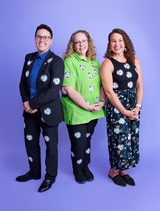
"When we opened the [King of Prussia] hospital back in Jan. of 2022, we started wrestling with questions like – how do we operationalize this mission? How can our team illicit trust and what matters most to our families? What does it mean to create an environment of belonging? How can we bring aspects of humanity into a large organization like CHOP," said Samantha Null, Program Manager, Patient-Family Services at the Middleman Family Pavilion, CHOP's King of Prussia hospital. "We know that cultivating this sort of culture does not just happen – but rather requires intentionality, curiosity, and the courage to know what we don't know."
The FVS team had the opportunity to address some of these mission-driven questions when a patient simply admired the colorful pronoun badge worn by their CHOP physician.
When leaving the King of Prussia Campus for the day, the patient asked our FVS team for a pronoun badge of their very own. The FVS team requested the patient's contact information and immediately began exploring all available options. A temporary solution was identified. The pronoun badge was printed using the FVS's existing visitor badge system and later mailed to the patient who wished to proudly display their pronouns with their school ID. But, for the FVS team at the Middleman Family Pavilion, this sparked an even larger, innovative idea: pronoun stickers for patients and families.
In May 2022, Marsha Pilgrim, Family and Visitor Services Coordinator, presented this idea to the King of Prussia Hospital Family Advisory Council. To say the topic was well-received is an understatement! There was also interest in having text-free stickers so our patients and families could display their chosen name and/or inform CHOP staff how they wished to be addressed.
To kick-off this initiative, Hope Heffner-Solimeo, Office of Diversity, Equity, and Inclusion (ODEI) Manager, offered several educational sessions at the King of Prussia hospital, focused on providing support and inclusive care for transgender and gender diverse patients and families. More than 50 King of Prussia Campus staff members attended the trainings! The pronoun stickers were also introduced to staff during these sessions and rolled out in Sept. 2022 on the King of Prussia Campus to our patients and families. We are grateful to our FVS colleagues for being innovative, taking action and, in doing so, driving diversity, equity, and inclusion across the King of Prussia Campus and ultimately, the organization!
"This story is an undeniable display of our ICARE Values in action," said Christina Furlong, Program Specialist, Patient-Family Experience. "Not only does it show compassion and respect for our gender diverse patients and families, excellence and innovation, but the collaboration between departments across the enterprise was simply amazing to be a part of." The ODEI, Family and Visitor Services, Patient-Family Experience, the Gender Clinic and Marketing partnered together throughout the summer months to bring the vision to life.